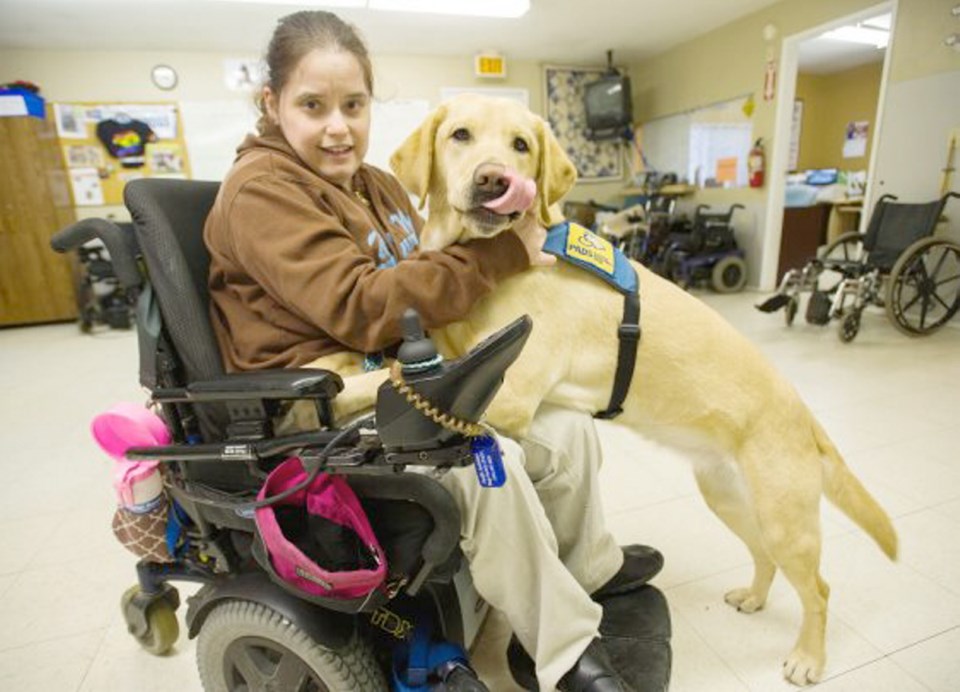If there is one thing Nicole Whitford knows, it’s that chihuahuas are never trained as service dogs in B.C.
Yet she sees service dog vests on these tiny animals — and on other ill-behaved, untrained, fake service dogs — from time to time.
Whitford is a volunteer at Pacific Assistance Dogs Society, and has had Walker, her yellow lab retriever service dog, for nine months. Whitford has cerebral palsy and Walker helps her with everyday tasks such as opening and closing doors, putting on and taking off her jacket and picking things up.
Whitford said she’s seen numerous examples of dogs that don’t look as if they’re properly trained to be service dogs. Some are obviously too small to do the job; others don’t behave properly in public.
“I think having fraudulent service dogs undermines what real service dogs do,” Whitford said.
“They’re not pets that we bring around. They provide a service — I need her to pick things up. You can tell the way the dog is and the handler. You see someone walking around with her chihuahua and she calls it a service dog. It’s too small to be your service dog. I see it all the time.”
Now the provincial government plans to make it much more difficult for people to disguise their untrained pet as a service dog by covering it with an official looking vest ordered online.
Legislation introduced earlier this month will require certified guide and service dogs to carry visible identification in public, such as a tag or card for its vest.
The Guide Dog and Service Dog Act will update and modernize legislation that hasn’t been changed in 30 years, said Laura Watamanuk, executive director of PADS, the only accredited service dog agency in B.C.
Burnaby-based PADS breeds, raises, trains and places service dogs in Western Canada. It trains Labradors and Golden retrievers to help people with physical tasks and smaller breeds such as Jack Russels and Shelties to help people who are deaf or hearing impaired. Chihuahuas may be loving companions, but PADS does not train them as service dogs.
Watamanuk said PADS is contacted weekly by people who are upset at seeing badly socialized dogs and dogs with no training being passed off as service dogs.
“It’s going to be a way for us to regulate and minimize those abusing the system,” she said.
“So many of our clients have had experiences with ill behaved dogs. We’ve worked 28 years at educating the public and providing dogs of good behaviour. It’s really disheartening when someone comes in and abuses the system.”
Guide dogs are dogs trained to help the blind and visually impaired; service dogs are trained to help people with other disabilities such as people in a wheelchair who can’t pick up objects, and others who are hearing impaired. There are about 200 registered guide and service dogs in B.C.
Watamanuk said the problem is particularly acute in the U.S. where there have been cases of people claiming their horses, kangaroos and ferrets are trained service animals.
“People are getting (illegal) identification online and they’re taking their animal into a restaurant,” she said.
“It’s not for physical support. A lot of times it is out of convenience. It is very hard on our industry. If it is an ill-behaved dog, people will be less favourable disposed when a PADS-trained dog comes in.”
As the act works its way through the legislative process, regulations are expected to be added that would increase fines and allow police to issue tickets to anyone refusing access to someone with a guide or service dog or someone misrepresenting their dog as a guide or service dog, Watamanuk said.
Under the proposed legislation, people with guide and service dogs living in strata title buildings will be exempt from restrictive pet bylaws. People will also no longer be forced to make an emotional choice and give up their guide or service dog when it has reached retirement. That was often the case with people who needed to get a second dog but were prohibited from doing so because their housing situation allowed only one service or guide dog.
Watamanuk said the new act will also allow unlicenced puppies in training to go into any public place a certified dog can go.
The new act will mandate that guide and service dogs will have to be trained by organizations accredited by Assistance Dogs International, like PADS, or the International Guide Dog Federation. A system will also be established to certify dogs trained outside B.C., or by non-accredited schools.
Jane Dyson, executive director of Disability Alliance BC, said once passed by the legislature, the new act will make it easier for the public to be sure about what is a service or guide dog and what isn’t.
“It will improve the access rights for people with disabilities,” she said. “There will be some public education campaigns so people will be better able to understand the purpose of service and guide dogs.”



